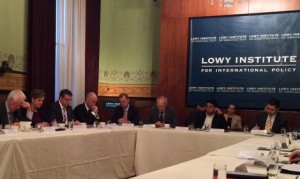2nd July 2015 Canberra, Australia
Let’s talk about dialogue
What do you get if you put 30 academics and diplomats in a room for two days? No, this is not the start of some lame joke about hot air, or people thinking twice before saying nothing, it’s what happened in Sydney recently.
I was part of the second Australia-UK track 1.5 Asia Dialogue last week. The title doesn’t really trip off the tongue, but basically the ‘track 1.5’ bit means academics and diplomats get together to talk about specific issues (the Institute for Multi-Track Diplomacy explains the different ‘tracks’ of diplomacy if you are interested). The Dialogue was a UK and Australian government idea endorsed by our respective Foreign Ministers two years ago.
This was the second meeting. The first, last year, was held in the amazing surroundings of Ditchley Park in Oxford. This year, the UK delegation got to experience the buzz of Sydney. With one of the largest Asian migrant diaspora in the world, it was a fitting location for our discussions.

An impressive range of academics and government officials from the UK and Australia met at the Lowy Institute to look at ways the UK and Australia can work together on some of the most important foreign and security policy issues in Asia.
So what was the point?
From the outside it may have looked like a good opportunity for two groups of people known for their love of talking to have a good chinwag for two days. But there was much more to it than that. Having been involved in both dialogues, here is my take on why it is an important event:
- It gets to the point. The Dialogue is a sort of speed dating service for academics and policy makers. The Dialogue throws us all together for a short period of time. It is amazing how the time constraints focus the mind on what really matters and what we can do about it. So we short circuit the normal timeframes involved in research and analysis, but because of the experience of the people in the room, we don’t compromise on the quality.
- It makes you think (twice). There is a huge amount of experience in the room and many competing views. So assumptions are challenged and conclusions are tested. As a policy maker, this is great. This should lead to better analysis and better policy making.
- Diversity of thought. The cast list was wide. We had participants from the UK and Australia, and importantly, ones based in Asia. There was a diverse range of views, there was disagreement and there were some left-field ideas. It all adds to the strong foundation on which good policy is made.
What did we get out of it?
I am an advocate for this type of event. If we get them right, they really help us make good policy. But the UK-Australia Dialogue is more than that. Because it is between two very close partners, we can use it to really strengthen the UK’s relationship with Australia, particularly in how we work together in the Asia region. We are doing a lot together already, so we’re always in the market for new ideas.
My assessment: it was a success. We covered a range of subjects from maritime tensions to the challenge of violent extremism in Asia. The ideas and recommendations from last week will feed into the annual cycle of high level meetings between the UK and Australia culminating in the annual meeting of foreign ministers, AUKMIN, next year. So watch this space as our ideas develop.